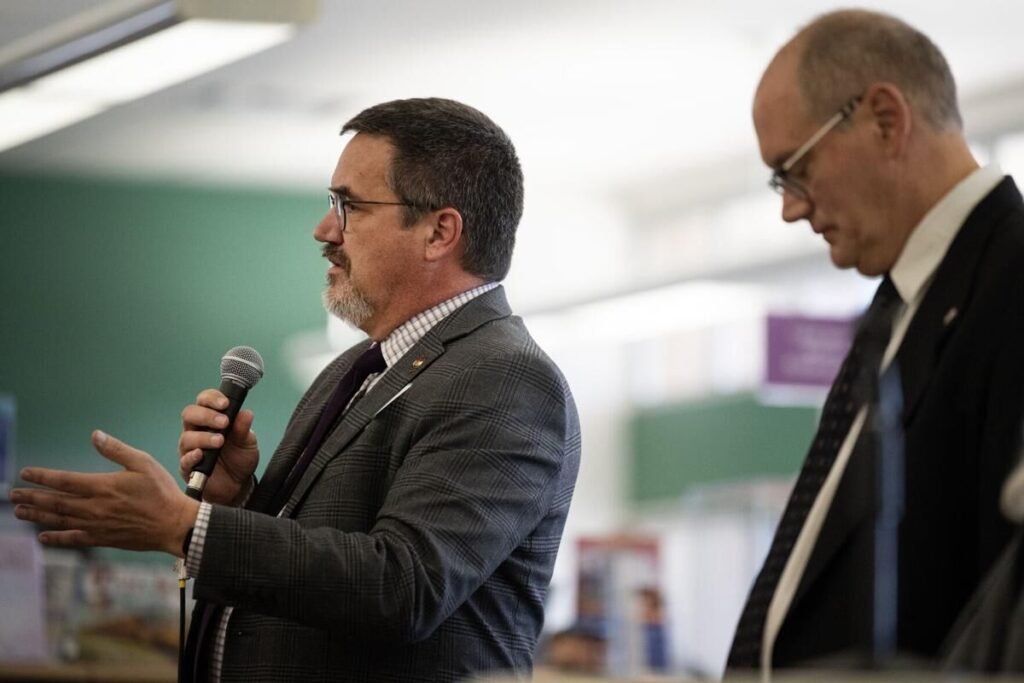Colorado’s appeals court dismisses defamation lawsuit over article about ‘furries’ discussion
Colorado’s second-highest court on Thursday dismissed a lawsuit against a journalist and her news outlet, finding a Jefferson County judge incorrectly believed a series of publications about a parental advocacy group could support a defamation claim.
Lindsay Datko and her organization, Jeffco Kids First, filed suit alleging, among other things, that an October 2022 news article falsely reported she had asked her 6,000-member Facebook group to “have their kids secretly record their classmates.” The disputed Facebook post came in response to a concern about children allegedly dressing like “furries” — which briefly became an issue in Colorado’s gubernatorial campaign that year.
A Jeffco judge declined to dismiss the lawsuit, believing the post “can be interpreted to mean” that Datko simply wanted students to record their own experiences, not their classmates. But a three-judge Court of Appeals panel noted that was not the sole interpretation of the post, and the news article included Datko’s full comments for readers to evaluate themselves.
“The challenged statements were a rational interpretation of Datko’s September 2022 Facebook post,” Judge Melissa C. Meirink wrote in the July 3 opinion. “Readers of the Facebook post and the article could and did interpret the post to mean that Datko was asking for pictures and recordings of students dressed as or behaving like furries.”
In March 2022, a member of the Jeffco Kids First Facebook group posted a photo of a student at school in a furry costume, meaning a cat- or dog-like animal. The post generated substantial discussion in the comments and Datko emailed Jeffco Public Schools to ask for further information.
In September, Republican gubernatorial candidate Heidi Ganahl said on a radio talk show that there were children dressing as furries “all over Colorado.” Ganahl later added she was aware of “30 different schools that this is happening,” including in Jeffco.
Shortly afterward, Datko posted to her Facebook group: “The media is really trying to spin this. If any of your kids would be willing to record anonymous audio of their experiences with furries hissing, barking, clawing, chasing, and how it affects their school day, please send to me or let me know ASAP!”
Rylee Dunn, a reporter with Colorado Community Media, looked into the Jeffco Kids First Facebook page. Although she had contacted Datko earlier in the summer for an interview about the group, Datko had not responded. In early October, Dunn published a story about Jeffco Kids First in the Arvada Press.
Datko sought a retraction of the article’s statement that she had “urged the nearly 6,000 members of Jeffco Kids First to have their kids secretly record their classmates.” In response, the outlet added an editor’s note explaining Datko’s view that her Facebook post only sought “anonymous verbal statements from children.” The paper also included a screenshot of the post itself.
Days later, based on Dunn’s article and a radio interview with Datko, former CCM editor Thelma Grimes wrote an opinion column stating that “encouraging people to take pictures of children who behave or dress differently is nothing but a form of bullying that no kid deserves.”
Datko and Jeffco Kids First then sued Dunn and Colorado Community Media for libel, based on the news article and Grimes’ column.
The defendants sought to dismiss the lawsuit under Colorado’s “anti-SLAPP” law, which stands for “strategic lawsuits against public participation.” The legislature enacted the law in 2019 to provide a mechanism to quickly dispose of litigation that implicates a person’s First Amendment rights — specifically, the rights to free speech and to petition the government.
District Court Judge Ryan P. Loewer denied the motion, finding the plaintiffs were likely to succeed. In a July 2024 order, he noted Datko’s post “can be interpreted to mean that the request was not intended for the recording or memorializing of other children or others’ experiences or others’ school days.”
In contrast, “Dunn’s reporting and interpretation of the post reads much more liberally,” he added.
Loewer also believed the plaintiffs had shown Dunn and Colorado Community Media exhibited “actual malice,” as evidenced by Dunn’s critical statements toward Datko and Jeffco Kids First on social media.
The defendants appealed, arguing that regardless of Datko’s intent, her post could reasonably be interpreted as Dunn’s article portrayed it. Further, Dunn had provided Datko’s exact words to readers.
As for whether Dunn exhibited actual malice with her social media posts, attorney Steven D. Zansberg argued that was not the legal standard.
“We’re not contesting that Ms. Dunn authored several things indicating she did not think very highly of this group, including its anti-LGTBQ positions. That’s not contested. But that’s not actual malice,” Zansberg, who represents media organizations, told the appellate panel at oral arguments. “Actual malice is either knowledge of falsity or a high degree of awareness of probable falsity.”
The Court of Appeals panel agreed Loewer had improperly focused on Dunn’s social media statements and Datko’s intent. Meirink pointed out the Facebook post was subject to multiple interpretations, and the article’s inclusion of Datko’s actual words undermined any legal claim of malice.
“Including this information counters any inkling of actual malice because it allows readers to come to their own conclusions about the post and challenged statement,” she wrote.
“We pursued this legal case in defense of our integrity, our reputation and the thousands of families we serve. We thank our supporters who have stood firmly by us throughout this process and reaffirm our dedication to supporting safe, respectful and effective learning environments for all children,” Datko told Colorado Politics. “We are looking at our options going forward to restore what was taken.”
Lawyers for the defendants did not immediately respond to a request for comment.
The case is Datko et al v. Dunn et al.
Editor’s Note: Thelma Grimes is the current deputy editor for Colorado Politics.














